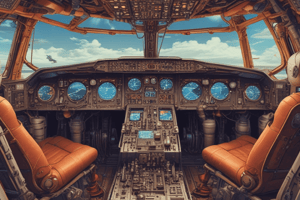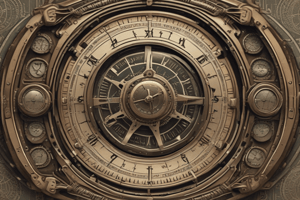Podcast
Questions and Answers
What is the primary function of aircraft instruments?
What is the primary function of aircraft instruments?
- To enhance the aircraft's speed and altitude
- To measure, record, or control values for the pilot (correct)
- To provide navigational guidance only
- To control the engine speed directly
Which category of instruments would provide information about the engine's performance?
Which category of instruments would provide information about the engine's performance?
- Auxiliary Instruments
- Systems Instruments
- Engine Instruments (correct)
- Flight and Navigational Instruments
Which of the following is NOT a feature of the instruments in an aircraft?
Which of the following is NOT a feature of the instruments in an aircraft?
- They should be visible to flight crew members
- They control the aircraft's navigation systems directly (correct)
- They provide illumination for night flying
- They help present various operational data to the pilot
What is an example of a Flight and Navigational Instrument?
What is an example of a Flight and Navigational Instrument?
Which of the following instruments falls under the Systems Instruments category?
Which of the following instruments falls under the Systems Instruments category?
What type of information would a pitot-static system provide?
What type of information would a pitot-static system provide?
What are auxiliary instruments primarily used for in aviation?
What are auxiliary instruments primarily used for in aviation?
Why is it important for aircraft instruments to be illuminated for night flying?
Why is it important for aircraft instruments to be illuminated for night flying?
What is the term for pressure measured with reference to a complete vacuum?
What is the term for pressure measured with reference to a complete vacuum?
Which type of pressure is represented by the reading on a pressure gauge?
Which type of pressure is represented by the reading on a pressure gauge?
What is dynamic pressure also known as?
What is dynamic pressure also known as?
Which pressure is considered the pressure of air at rest?
Which pressure is considered the pressure of air at rest?
What does differential pressure represent?
What does differential pressure represent?
Which pressure measurement is directly related to atmospheric pressure?
Which pressure measurement is directly related to atmospheric pressure?
Which pressure is sensed by a Pitot tube while an aircraft is in motion?
Which pressure is sensed by a Pitot tube while an aircraft is in motion?
What is barometric pressure commonly referred to?
What is barometric pressure commonly referred to?
What is the primary function of gyro instruments in aviation?
What is the primary function of gyro instruments in aviation?
Which instrument is NOT included in the Basic 6 panel setup?
Which instrument is NOT included in the Basic 6 panel setup?
What does the P2 instrument panel primarily display?
What does the P2 instrument panel primarily display?
How are instruments arranged in a Basic 'T' Panel?
How are instruments arranged in a Basic 'T' Panel?
Which display unit is responsible for displaying the primary flight information?
Which display unit is responsible for displaying the primary flight information?
What is one prevalent feature of electrical and electronic instruments?
What is one prevalent feature of electrical and electronic instruments?
Which of the following instruments would NOT be displayed on P3 instrument panel?
Which of the following instruments would NOT be displayed on P3 instrument panel?
What type of panel consists of six interchangeable integrated display units?
What type of panel consists of six interchangeable integrated display units?
What is the largest constituent of the Earth's atmosphere?
What is the largest constituent of the Earth's atmosphere?
How does increasing altitude affect air pressure?
How does increasing altitude affect air pressure?
At sea level, what is the standard atmospheric pressure?
At sea level, what is the standard atmospheric pressure?
What effect does temperature have on the volume of a gas, assuming constant pressure?
What effect does temperature have on the volume of a gas, assuming constant pressure?
What happens to the density of air as pressure decreases?
What happens to the density of air as pressure decreases?
Which gas is found in the second-largest percentage in the atmosphere?
Which gas is found in the second-largest percentage in the atmosphere?
What is the impact of high altitude on the weight of air?
What is the impact of high altitude on the weight of air?
Which gas contributes the least to the composition of the atmosphere?
Which gas contributes the least to the composition of the atmosphere?
Flashcards
Instrument
Instrument
A device for measuring, recording, or controlling, especially one used as part of a control system.
Instrument Categories
Instrument Categories
Instruments are grouped by how they function or what information they display.
Flight & Navigational Instruments
Flight & Navigational Instruments
These instruments give information about speed, altitude, attitude, heading, and rate of climb.
Engine Instruments
Engine Instruments
Signup and view all the flashcards
Systems Instruments
Systems Instruments
Signup and view all the flashcards
Operational Categories
Operational Categories
Signup and view all the flashcards
Pitot-static system
Pitot-static system
Signup and view all the flashcards
Instrument Pneumatic System
Instrument Pneumatic System
Signup and view all the flashcards
Pressure instruments
Pressure instruments
Signup and view all the flashcards
Mechanical instruments
Mechanical instruments
Signup and view all the flashcards
Gyro instruments
Gyro instruments
Signup and view all the flashcards
Electrical and electronic instruments
Electrical and electronic instruments
Signup and view all the flashcards
Basic 6 panel
Basic 6 panel
Signup and view all the flashcards
Basic 'T' panel
Basic 'T' panel
Signup and view all the flashcards
P1 instrument panel
P1 instrument panel
Signup and view all the flashcards
P2 instrument panel
P2 instrument panel
Signup and view all the flashcards
Glass Cockpit
Glass Cockpit
Signup and view all the flashcards
Atmosphere
Atmosphere
Signup and view all the flashcards
Temperature Effect on Air
Temperature Effect on Air
Signup and view all the flashcards
Pressure Effect on Air
Pressure Effect on Air
Signup and view all the flashcards
Altitude Effect on Air
Altitude Effect on Air
Signup and view all the flashcards
Atmospheric Pressure
Atmospheric Pressure
Signup and view all the flashcards
Gravity and Atmospheric Pressure
Gravity and Atmospheric Pressure
Signup and view all the flashcards
Barometric Pressure
Barometric Pressure
Signup and view all the flashcards
Absolute Pressure
Absolute Pressure
Signup and view all the flashcards
Gauge Pressure
Gauge Pressure
Signup and view all the flashcards
Pitot Pressure
Pitot Pressure
Signup and view all the flashcards
Static Pressure
Static Pressure
Signup and view all the flashcards
Differential Pressure
Differential Pressure
Signup and view all the flashcards
Dynamic Pressure
Dynamic Pressure
Signup and view all the flashcards
Static Pressure Measurement
Static Pressure Measurement
Signup and view all the flashcards
Study Notes
AKD 20803 Basic Instrument
- The course covers various basic instruments used in aircraft, including pressure measuring devices, temperature measuring instruments, engine speed measuring instruments, and more.
- This includes mechanical movement measurement, synchronous data transmission systems, gyroscopic instruments, compasses, instrument pneumatic systems, pitot-static systems, fuel quantity indicating systems, fuel monitoring systems, auxiliary instruments, and maintenance practices.
Instruments
- An instrument is a device used for measuring, recording, or controlling, especially one functioning as part of a control system.
- Aircraft instruments are often referred to as gauges, indicators, or tools.
- Instruments communicate information to the pilot, displaying the value/quantity or situation/position of a system.
- Instruments should be positioned for easy viewing by flight crew members.
- Adequate lighting is essential for nighttime flying, ensuring it doesn't hinder the pilot's vision.
Instruments - Categorization
- Instruments can be categorized based on how they function or the type of information they provide.
Categories According to Presentation
- Flight and Navigational Instruments: Provide information about speed, altitude, attitude, heading, and rate of climb. Examples include airspeed indicators, compasses, altimeters, artificial horizons, and vertical speed indicators.
- Engine Instruments: Provide information on engine operation and power plant systems. Examples include engine speed, EPR (engine pressure ratio), manifold pressure, and EGT (engine exhaust gas temperature).
- Systems Instruments: Offer information on aircraft systems like hydraulics, electrics, and pressurization. Examples include voltmeters, suction gauges, vibration indicators, and torquemeters.
Categories According to Means of Operation
- Pressure Instruments: Measure air, fuel, and oil pressure.
- Mechanical Instruments: Employ mechanical systems to gather and transmit information.
- Gyro Instruments: Use gyroscopic principles to primarily display aircraft attitude and heading.
- Electrical and Electronic Instruments: Utilize wires, fiber optics, and digital technology to sense and transmit information for display and warnings.
Panels and Layout
- Instrument panels allow for mounting and installing aircraft instruments.
- A basic 6-panel layout includes airspeed indicator, attitude indicator, vertical speed indicator, altimeter, heading indicator, and turn and bank indicator.
- The "T" panel configuration includes an airspeed indicator, attitude indicator, altimeter, and heading indicator arranged in a "T" shape.
- Other possible configurations include radial and linear layouts.
Instrument Panel (P1, P2, P3)
- P1: Aircraft captain's panel, featuring flight and navigational instruments.
- P2: Combined panel for the captain and first officer, housing engine instruments.
- P3: Panel for the first officer, incorporating flight and navigation instruments.
Electronic/Glass Cockpit Panel
- Composed of interchangeable integrated display units (CRT), enabling various displays.
- EADI: Displays the primary flight display (PFD).
- EHSI: Displays the navigational display (ND).
- EICAS: Displays primary and secondary engine parameters and system warnings.
Glass Cockpit
- A cockpit design utilizing digital displays rather than traditional gauges.
- Examples include panels with EFIS (Electronic Flight Instrument System) components like PFD (Primary Flight Display) and ND (Navigation Display).
Atmosphere and Related Concepts
- Atmosphere: A mixture of gases surrounding Earth. Nitrogen comprises roughly 78%, oxygen approximately 20%, and other gases (carbon dioxide, argon, neon, helium, xenon, water vapor) make up the remainder.
- Atmospheric Pressure: The force exerted by the atmosphere per unit area, measured in PSI or bar. Pressure decreases with increasing altitude.
- Absolute Pressure: Pressure measured relative to a perfect vacuum.
- Gauge Pressure: Pressure measured relative to ambient atmospheric pressure.
- Pitot Pressure (Dynamic Pressure): Pressure resulting from the aircraft's forward motion through the air, measured by pitot tubes. A gauge of airspeed.
- Static Pressure: Pressure of the atmosphere at rest, sensed by static vents (or static ports). Provides a reference for barometric pressure.
- Differential Pressure: Difference between two pressures, crucial in many measurement applications.
- Lapse rate: Rate at which atmospheric pressure and temperature change with altitude.
Studying That Suits You
Use AI to generate personalized quizzes and flashcards to suit your learning preferences.



